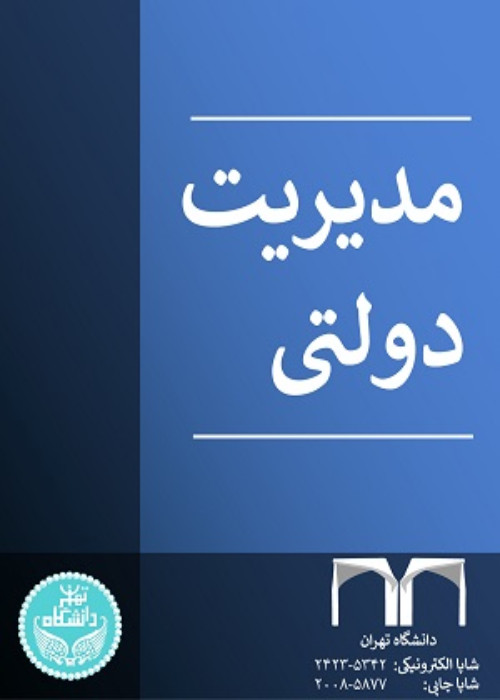Behavioral Nudges and Public Policy; Implications to Overcome Policy Makers Biases
Author(s):
Article Type:
Research/Original Article (دارای رتبه معتبر)
Abstract:
Objective
This paper examines the application of nudges as a behavioral tool and also welcomes behavioral nudges in overcoming policymaking biases. According to behavioral research, policymakers are subject to different biases that may lead to errors and misunderstandings in the process of decision-making. Recognizing that policymakers are not immune from these biases, the paper explores the use of nudges as alternative regulatory tools for governments in influencing policymakers’ behavior. The question now is how and under which circumstances nudges operate and interact with those biases.To support the argument, the paper also investigates some examples of cognitive biases and behavioral nudges in Iranian organizations.Methods
In the first stage of the study, by using a mixed method, mental patterns were extracted. Then, researchers conducted in-depth interviews including behavioral biases and nudges. In the second stage, by using the Q methodology and factor analysis, the results were extracted. In the following, the data were arranged in the form of T tables. The average of the total variance of biases and nudges was extracted. Due to the special nature of the subject, we made a combination of theoretical studies and field research findings. The researchers were influenced by the results of the interviews to present experts' conceptual framework. Based on the literature review and the interviews conducted, conceptual codes were extracted and categorized into 31 themes.Results
The results showed that policymakers are subject to cognitive errors and cognitive biases. In the conducted studies, 14 biases were categorized and divided into three determining patterns. It was specified in the form of informative and inspiring nudges. Also, we did the investigation for 16 elements referring to behavioral nudges of policymakers. By examining different cognitive biases, behavioral nudges can help design a better choice architecture for policymakers.Conclusion
By examining different cognitive biases, the paper discussed policymakers’ mistakes when they are dealing with decisions about public problems. In this regard, nudging tools can help design a choice architecture to frame decisions in ways that could lead to more public welfare. The results showed for inspirational nudging, fundamental shake-ups, constitutional amendment, administrative reforms, and the creation of a space for discourse and the creation of new presuppositions are more critical. For the awareness nudging model, 14 nudges were categorized. In this regard simulation and future study of a policy, mental stereotypes analysis, realism, and change of mental patterns are highlighted. Considering the findings, nudges can play a regulatory role in focusing on the effects and aspects of public events. The article concludes with some ideas for improving nudges and suggestions for future research.Keywords:
Language:
Persian
Published:
Quarterly Journal Public Administration, Volume:15 Issue: 53, 2023
Pages:
41 to 66
magiran.com/p2567535
دانلود و مطالعه متن این مقاله با یکی از روشهای زیر امکان پذیر است:
اشتراک شخصی
با عضویت و پرداخت آنلاین حق اشتراک یکساله به مبلغ 1,390,000ريال میتوانید 70 عنوان مطلب دانلود کنید!
اشتراک سازمانی
به کتابخانه دانشگاه یا محل کار خود پیشنهاد کنید تا اشتراک سازمانی این پایگاه را برای دسترسی نامحدود همه کاربران به متن مطالب تهیه نمایند!
توجه!
- حق عضویت دریافتی صرف حمایت از نشریات عضو و نگهداری، تکمیل و توسعه مگیران میشود.
- پرداخت حق اشتراک و دانلود مقالات اجازه بازنشر آن در سایر رسانههای چاپی و دیجیتال را به کاربر نمیدهد.
In order to view content subscription is required
Personal subscription
Subscribe magiran.com for 70 € euros via PayPal and download 70 articles during a year.
Organization subscription
Please contact us to subscribe your university or library for unlimited access!


